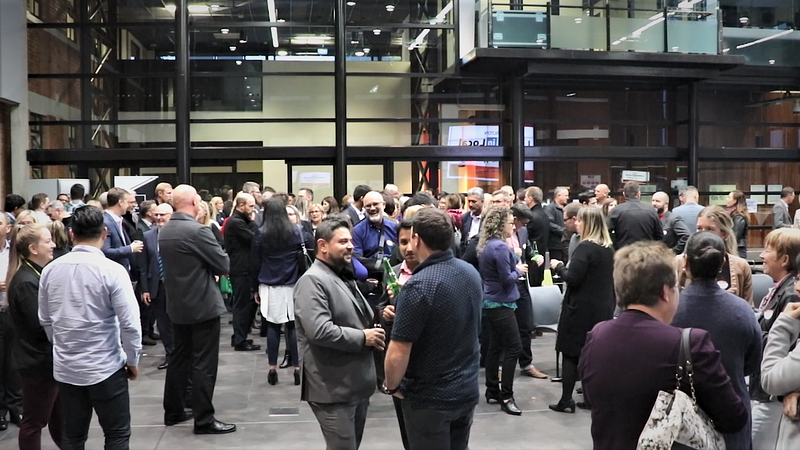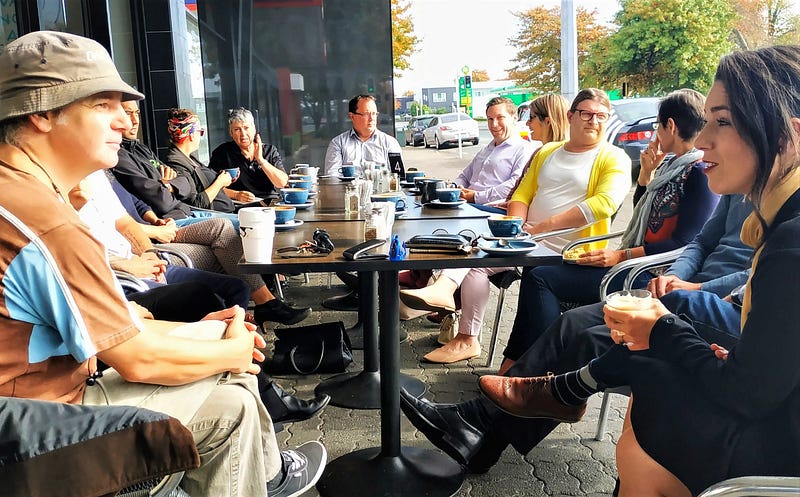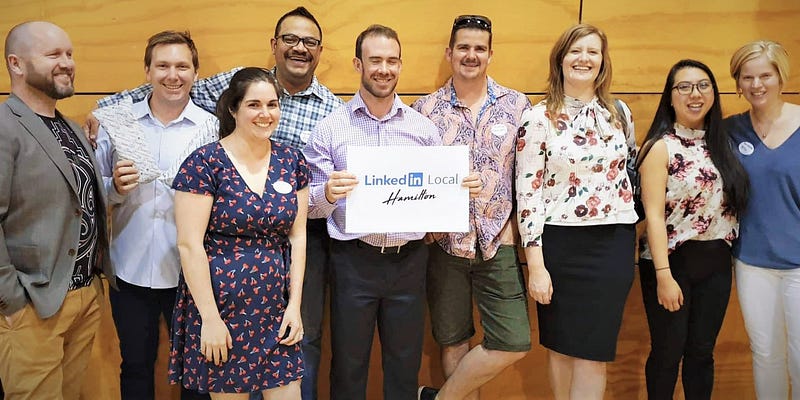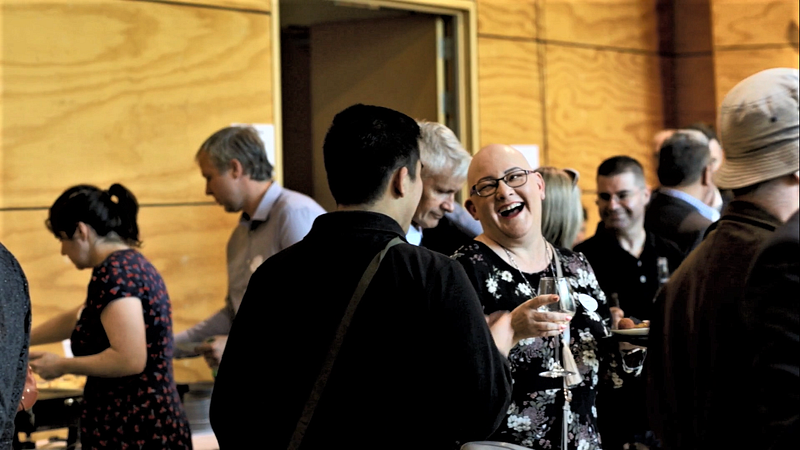Networking is a powerful tool for business people to meet relevant people that can help them further their career, whether it is a new job or new clients. As they say, "It's not what you know but who you know."

What Is Business Networking?
Business networking is the act of interacting and conversing with other people to develop professional contacts and exchange information, usually in the setting of an event or meeting. Networking helps individuals to establish and nurture long-term and mutually valuable relationships, popular with career-focused professionals.
The aim is usually to expand one’s circle of influence and acquaintances to enhance opportunities to further one’s career — whether it is a new job or promotion or to meet potential future clients, customers or business partners. Invest time (and a little bit of money) into increasing your networks and relationships — personal and professional, and in the long-run, you will reap the benefits.
Although we often have individual goals, we should not forget that networking is for mutual benefit. If you want to further your career opportunities, you should be networking. Opportunities to network exist all around us. At the supermarket. At the gym. Picking up the kids from school or watching them play sport, or at religious gatherings. We should not neglect our networks as an opportunity to grow our business network. As they say, it is not what you know, but who you know.
Growing your networks will help you establish rapport and trust in your local community, so look for opportunities to network strategically. Consider locations where you are likely to meet new people with common professional or personal interests, and where you feel comfortable. Volunteering is one way to meet people and put yourself in a positive light, whether its coaching or for a local community group.
Business networking events
There are several options out there for business networking, this section will cover a few of those options to help you choose what might be best for you. There is not a “one size fits all” for networking — different settings and strategies will suit different people.
Try different networking events to see what is more comfortable for you. Do you like busy open networking events with noise and atmosphere, or would you prefer a sit-down coffee group with a dozen or so people, each taking a turn to talk? Whether you have introvert or extroverted characteristics will influence how comfortable you are in a certain setting.
Once you have worked out what type of networking setting suits you best, think about where you can meet the right kinds of people to help you further your career.
Chamber of Commerce
If you join your local Chamber of Commerce, often they have a range of events set up for their members. The goal of a Chamber is to help promote, support and encourage sustainable, profitable business growth in the local community for its members. Often, they run events once or twice a month where there are designated speakers on a particular theme, and there is a networking portion of the event.
BNI
The BNI group (Business Network International) is one of the most well-known and popular networking groups for business professionals. BNI is an American model franchised around the world, boasting over 270,000 Members in 9,500 Chapters worldwide. They call themselves “the world’s leading business referral organisation”. They are often very structured, and members meet weekly or fortnightly, usually over breakfast. There are a large emphasis and expectation to provide referrals for other members and because of this there is a membership fee to be a member, and typically only one person from each profession can be a member of each chapter.
Many of the networking skills discussed in this will not apply as this format is so structured and everyone gets a turn to talk about themselves and what they do.
 |
| Coffee networking group |
Coffee groups
Coffee groups are a fantastic way to build relationships with people over a period. You could consider starting your own, set up through a Facebook or LinkedIn group, or your local mailing list. I run a local coffee group who meet once a month on the same day, time and location, to make it easy to lock into the diary. Everyone gets 30 seconds or so to give their elevator pitch and then we all have informal discussions with the people next to us, or sometimes as a whole table (inevitably with 10–15 people, smaller conversations break out). There is no fee to attend and no obligations for referrals like a BNI, so it has quite a relaxed feel. Once you build trust with people, referrals will naturally come.
LinkedIn Local
LinkedIn Local is a business networking event set up to leverage the growing popularity of LinkedIn and its professional networks. It is in over 1000 cities around the world, and the format is dependent on the individual event and its host. Some events are small coffee group type gatherings or at a bar, and some are more large scale in a specific events space. I run one called
 |
| LinkedIn Local Hamilton networking event |
The benefits of networking
A strong professional network can have many benefits that can influence the success of your career and growth. Here are some of the benefits you will receive through planned and regular networking.
Career development
The overall goal for most people who attend networking groups is the evolution of their career. Some of those people might have a specific goal of short-term sales or to meet a certain person or type of person, but these goals all work towards the grand vision of being more successful in life and business.
People used to have jobs. Now people have careers. In an ideal world, more businesses would emphasize the professional development of their staff, but it is usually up to the individual to further their career. The average life span for a job is five years, even less for those under 35. Career-focused individuals often have an eye or ear out for better opportunities to further their careers.
Opportunities
Developing your career is a long-term game, and consistently networking will open many new doors for opportunities.
If you are a good networker, you will find opportunities to connect with different people everywhere you go. You could meet people who end up being a mentor to you or build a stronger relationship with somebody from senior management in your workplace. Do not dismiss the workplace as an opportunity for networking. Often large workplaces have an end of week or end of month drink, could be beneficial to your career progression.
You could also use environments such as after school sport when you chat with other parents as an opportunity to improve your soft skills and you never know where opportunities come from. It is all about building relationships with relevant people consistently over a period
For those people who have recently lost a job or have just finished their study and are looking for a professional role, networking is the perfect opportunity to put yourself out there to grab any opportunities. You never know who you might meet who could be hiring or can give you a lead or referral which lands you the role you desire. They might just connect you with the right people. Networking helps you watch the local job market.
Just like it can help you find a new job; networking is a great environment to meet clients. There more people you meet who know what you do, the more likely you are to find new clients who want to engage you. Whether it is directly or through referral because of the trust you have built through networking.
Increasing your local profile
If you have been to a networking event before, you have probably noticed that there seems to be somebody who knows everybody. Chances are, they are probably regular on the local networking scene. Professionals can leverage networking to increase their profile. When you become well known and well respected with many people, this increases their general awareness of what you do and your expertise, leading to more business opportunities.
 |
| Networking event — LinkedIn Local Hamilton |
“Every man I meet is my superior in some way. In that, I learn of him.” (Carnegie, 1936)
Exchange ideas & knowledge
Networking is the perfect opportunity to learn. Therefore, a key skill to have as a networker is the ability to listen, as people who are strong networkers often exchange valuable information that is not public and only gained through conversation.
Whether it is keeping up with general current affairs, local news or industry knowledge and trends; the ideas and information gained from networking can help a career move forward. This sharing of knowledge also helps cement relationships by enhancing your credibility and mutual trust. Networking is a two-way street, so do not underestimate what value you can provide through sharing your knowledge.
Boost your confidence
Networking will help you develop and improve your soft skills which will increase your confidence to start conversations with new people. This increased self-esteem can be beneficial in the workplace when having conversations with senior staff members, or in your next job interview. Without having to consciously think about it, your body language will be a lot more positive from this self-belief.
Students often have not had many conversations with working professionals and once they leave their bubble of student life they can be a little nervous in job interviews or networking for the first time. It can be daunting. Actively trying to interact with professionals in your industry to gain networking experience and confidence can really set you apart from your peers in the job hunt.
Networking skills
Although it seems like great networkers are naturals, and often extroverts can be, it is just as much a skill learned and acquired. Here are ten networking skills or tips that you can use to become better at networking.
Have a plan
The first thing you can do to improve your networking is to have a plan. I must admit, when I first started networking, I had no idea what I was doing and would stand awkwardly in the corner and get nothing from it. Building a network is just like any other goal you have in life, and therefore, you need some sort of plan on how to achieve this goal.
Often people uncomfortable with networking view it as a work activity, which can make it seem quite loathsome. This mindset will not put you in the right frame of mind for networking. If you link networking with a higher goal, you will come into it with a much more positive mindset.
Whilst you do not need a specific goal for each event like I have to talk to X person, it is important to plan what you want to achieve so you increase your chances of meeting the right people. Choosing the right events to attend can define your success at a networker. Having broad goals for each event such as meeting with three people in your industry and knowing what actions you need to take.
Find familiar faces
If you are feeling uncomfortable and anxious about networking with people you do not know, look for people you are familiar with and join their group. It might be work colleagues or people you have met briefly previously. If you start here, you are likely to meet new people through them introducing you to people they know. You will also grow in confidence and after a while, you will get a feel for the atmosphere and should grow enough courage to approach other groups.
 |
| Networking event |
Find other people who are alone
If you cannot spot anybody that you know, try and find other people that are there alone. Chances are that they are feeling just as awkward as you are! Not everybody who attends networking events are seasoned pros. Often there will be many people such as yourself who are new to networking or new to the area.
Approach them in a light-hearted way and ask if they are there alone too, and how it is awkward to not know anybody there when everyone else seems to know each other. You will probably share a laugh and their walls will come down and you might have a really enjoyable conversation. Other people might notice this and come and join you.
Position yourself near the bar if you are alone and looking for somebody to chat to. The worst thing you can do is try and capture people as they walk in. Chances are they are tired and or hungry after work, and the first thing they want to do is grab a drink. They will be far more comfortable and ready to chat if they have just grabbed a drink.
Remembering names
When you meet a person or group of people for the first time, do you forget their names 30 seconds after the introduction?
I am the first person to admit I am terrible at remembering names. Unless I am focusing on remembering names, it is like they are instantly gone from memory. This is not going to help your networking very much, as it can be very awkward to not be able to remember somebody’s name and you might steer clear of them to avoid the situation. On the flip side, people love to hear their name, and it will leave a great impression if you remember their name and introduce them to someone else.
Luckily, remembering names can be a learnt skill. Try and attach a visual cue to a unique facial or body feature of each individual. If it rhymes, that will help even more. You might meet a guy called Henry or Harry who has a long beard. The visual cue that helps you remember his name could be hairy.
Body language
Body language can be a crucial factor at networking events of how many conversations you attract in the evening. Go in with a positive mindset and Smile! If you are uncomfortable, try not to focus on this. Your body language will reflect you are feeling awkward and people will feel this energy and will not approach you. Try not to look serious. Focus on happy thoughts and be open with your body language.
Smile at anyone who looks in your direction and say hello. Whilst engaging in conversation, the head tilt is a positive cue you can use to create rapport with the other person. This body language shows the other person that you are interesting, paying attention and listening. Everyone likes to be listened to!
Entering conversations
One of the most difficult things to do as a networker is trying to enter a conversation already in full flow. Especially if none of the people in the conversation knows who you are. Confidence is essential when networking, but do not go in, all guns blazing and interrupt a group conversation.
Instead, wait for your moment. It will make a bad first impression if you interrupt the flow of the conversation. Start by listening and then find a moment where you can add some value. If you can ask somebody a question, this is a soft way you can enter a conversation.
Listening to others builds them up. A lot of people at networking events love to talk about themselves. If you are not a confident networker, let other people lead the conversation. If you show genuine interest, nod in the right places and ask questions to find out more about their experiences and opinion, it will leave a great impression without you having to say very much.
“You can make more friends in two months by becoming interested in other people than you can in two years by trying to get other people interested in you.” (Carnegie, 1936)
Focus on learning
As discussed earlier, the benefit of networking is the exchange of ideas and knowledge. Therefore, part of your mindset when networking should be to learn as much as possible. Focus on learning instead of what you plan to get out of that specific conversation, you will come across in a positive light.
Approach networking with curiosity and an open mind about what interesting people you might meet. If you want to learn something new about someone, your conversation will seem far more authentic to the other person. You may have an interesting conversation that gives you new ideas leading to new experiences. Concentrate how networking helps you boost your knowledge and skills to further your career.
Identify common interests
Memorable conversations often begin with a point of common ground. Your kids go to the same school or you are members of the same sports club. The sooner you can identify any similarities you have, the sooner you will build rapport with that person and the easier the conversation will flow. This will be the starting point for an ongoing professional relationship. Consciously think about how your interests and goals align with the people you are meeting.
The easiest way you can do this is by asking questions to find out more about them. The conversation will feel far less forced and more authentic and meaningful, which will be a lot more memorable than the previous conversation they had about the weather. They will also appreciate the fact you tried to get to know them a bit better and might introduce you to others in their network with mutual interests.
Pay it forward
Do not make the mistake of looking at networking from the perspective of something you do just to get something out of it personally. If you look at networking equally as an opportunity to help others, people will recognise this and be more willing to help you. Introduce your network to each other if you think they can mutually benefit and look for ways to provide value to people.
The more you learn about your new connections the easier it will be to help them. It could be anything from a restaurant recommendation to introducing them to someone in your network. A great networker will know people with skill and expertise in all kinds of areas. If they cannot help them personally, they will know someone who can. They will both feel grateful toward you for bringing them together, giving you brownie points.
There is nothing worse than talking to someone at a networking event and the conversation cut rudely short when the other person realises there is no immediate benefit for them to gain from that conversation and they walk away to talk to somebody else. Do not be that person!
Following Up
Following up with somebody with mutual interest after meeting them at a networking event might sound obvious, but it is something that many professionals fail to do. People get busy and you can quite quickly become forgotten, wasting the hard work you did putting yourself out there. Following up reaffirms what you discussed, establishing your connection with them and opens future communication. Within a couple of days, send them an email (assuming you swapped business cards) or connect with them on LinkedIn with a personalised message, reminding them who you are and your conversation.
Do not follow up too strongly, you do not want to ruin your hard work by coming across as clingy or desperate. Once you connect on LinkedIn, you can stay in touch through wishing them a happy birthday or tagging them in articles that could provide value to them. Just stay relevant — do not be pushy!
That‘s this week’s blog. I hope you enjoyed this week’s content about networking.
Now go out there and meet some people!

No comments:
Post a Comment